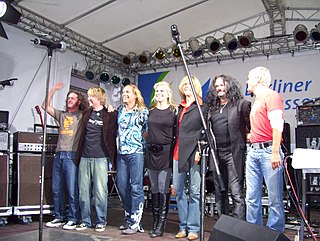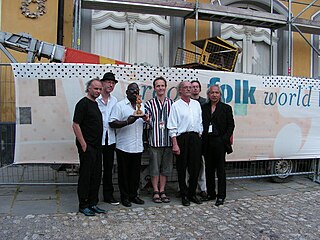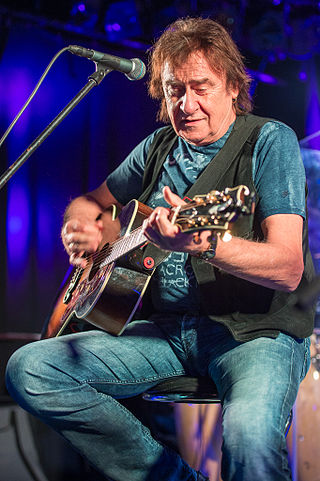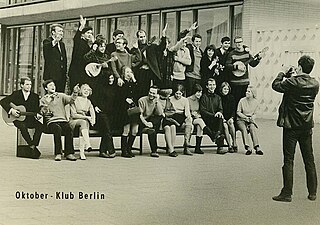Related Research Articles

Scorpions are a German hard rock band formed in Hanover in 1965 by guitarist Rudolf Schenker. The longest-existing, 1978–1992, and most successful line-up of the band included Schenker, Klaus Meine (vocals), Matthias Jabs, Francis Buchholz (bass), and Herman Rarebell (drums). The band's only continuous member has been Schenker, although Meine has been with the band continuously since their first album Lonesome Crow (1972). Jabs has been a consistent member since 1978, while bassist Paweł Mąciwoda and drummer Mikkey Dee have been in the band since 2003 and 2016, respectively.
Germany claims some of the most renowned composers, singers, producers and performers of the world. Germany is the largest music market in Europe, and third largest in the world.

The culture of East Germany varied throughout the years due to the political and historical events that took place in the 20th century, especially as a result of Nazism and Communism. A reflection on the history of arts and culture in East Germany reveals complex relationships between artists and the state, between oppositional and conformist art. In four decades, East Germany developed a distinct culture and produced works of literature, film, visual arts, music, and theatre of international acclaim. Popular culture specialities included among others a high popularity of nudism in Eastern Germany.

The Hochschule für Musik Hanns Eisler Berlin in Berlin, Germany, is one of the leading universities of music in Europe. It was established in East Berlin in 1950 as the Deutsche Hochschule für Musik because the older Hochschule für Musik Berlin was in West Berlin. After the death of one of its first professors, composer Hanns Eisler, the school was renamed in his honor in 1964. After a renovation in 2005, the university is located in both Berlin's famed Gendarmenmarkt and the Neuer Marstall.
Lenore Tamara Danz was the lead singer and lyricist of the East German rock group Silly. She succumbed to breast cancer at the age of 43.

Silly is a German rock band. Founded in East Germany in 1977, Silly was one of the country's most popular music acts, and was well known for its charismatic lead singer Tamara Danz. Her death in 1996 ended the band's recording career after 18 years. In 2005 the surviving members began to perform as Silly again, first with several guest singers, before choosing actress Anna Loos to replace Danz. The first album with the new line-up, Alles Rot, became the band's most successful to date, reaching number 3 on the German charts in 2010.

Harmonia was a West German musical "supergroup" formed in 1973 as a collaboration between members of two prominent krautrock bands: Cluster's Hans-Joachim Roedelius and Dieter Moebius joined by Neu! guitarist Michael Rother. Living and recording in the rural village of Forst, the trio released two albums—Musik von Harmonia (1974) and Deluxe (1975)—to limited sales before dissolving in 1976. AllMusic described the group as "one of the most legendary in the entire krautrock/kosmische scene."

Francis Buchholz is a German musician best known as the bass guitarist of German rock band Scorpions from 1973 until 1992. Since leaving Scorpions, he has been a member of Michael Schenker's Temple of Rock.

The Puhdys were a German rock band formed in Oranienburg, East Germany, in 1969, although by then they had been performing together—with various lineups—as the Puhdys since 1965. Although they are especially popular in their native eastern Germany, the Puhdys enjoyed significant success outside the GDR, and were one of the first East German bands allowed to tour West Germany. They are one of the most successful German-language rock groups.

The Poodles were a glam metal/heavy metal band from Sweden formed by the singer Jakob Samuel, bass guitarist Pontus Egberg, guitarist Pontus Norgren and drummer Christian Lundqvist.
German punk includes a body of music and a subculture that have evolved since punk rock became popular in Germany in the 1970s. Within the subculture of punk in Germany, a style of music called Deutschpunk was developed; this style of music has developed distinctly from hardcore punk, and includes lyrics in German as well as a fast tempo. In the punk scene in Germany, some bands play music in the Deutschpunk style, while other German punk bands pursue various other styles of punk music.
An overview of the evolution of Jazz music in Germany reveals that the development of jazz in Germany and its public notice differ from the "motherland" of jazz, the US, in several respects.

Barbara Buchholz was a Berlin-based German musician and composer. She was one of the leading theremin players of the world.
Ralf "Bummi" Bursy was a German pop and rock singer and music producer, who was particularly successful and popular in the German Democratic Republic until 1989.

Bayon was a German band founded around 1971 in the former GDR. Its musical style can be described as a mixture of folk, jazz, rock, and classical music. Internationally they came to prominence with their musical contribution Stell dich mitten in den Regen to the movie The Lives of Others. The name of the band derived from the Khmer temple Bayon in Cambodia.
Saskia Tomkins is a British musician and actress, living since 2007 in Ontario, Canada. She plays the violin, viola, cello and Nyckelharpa. She performs and records in several genres, including traditional, modern, jazz and classical music.

Krissy Matthews is a British-Norwegian blues rock singer-songwriter and guitarist. He had released three albums by the age of 18. His most recent and fifth album, Scenes From a Moving Window, was released by Promise Records in 2015.

Franz "Schnuckenack" Reinhardt was a German gypsy jazz musician (violinist), composer and interpreter. He was considered the "great violin virtuoso of Sinti music." He was a German Sinto; his music was mostly published and categorized under the contemporary names gypsy jazz or "Musik deutscher Zigeuner". He "made this music accessible to a broad public" and made the most significant contribution to the presentation of gypsy music and jazz in Germany into a concert form. He was the pioneer of this style of music in Germany and directly or indirectly inspired many of the succeeding generation of gypsy jazz players in that country, as well as preserving on record a great many folkloric and gypsy compositions for future generations.

Dieter "Maschine" Birr is a German singer, guitarist and composer. He was a longtime member of the rock band Puhdys, which dissolved in 2016.

Oktoberklub, initially known as the Hootenanny-Klub Berlin, was a political music group from the German Democratic Republic (GDR). The musical style of the group was a mixture of folk, chanson and rock music. Founded in 1966, the group disbanded in 1990. Occasional performances followed in 2002 and 2007.
References
- ↑ Robb, David (2000). "The GDR". Monatshefte. 92 (2). University of Wisconsin Press: 199–216. ISSN 0026-9271. JSTOR 30153882 . Retrieved 2024-10-19.
- 1 2 "Aus dem Festivalprogramm: Volkmann – Festival Musik und Politik". www.musikundpolitik.de. Retrieved 2016-05-03. (German)
- ↑ Robb, David (2007), "Political Song in the GDR: The Cat-and-Mouse Game with Censorship and Institutions", Protest Song in East and West Germany since the 1960s, Boydell & Brewer, pp. 227–54